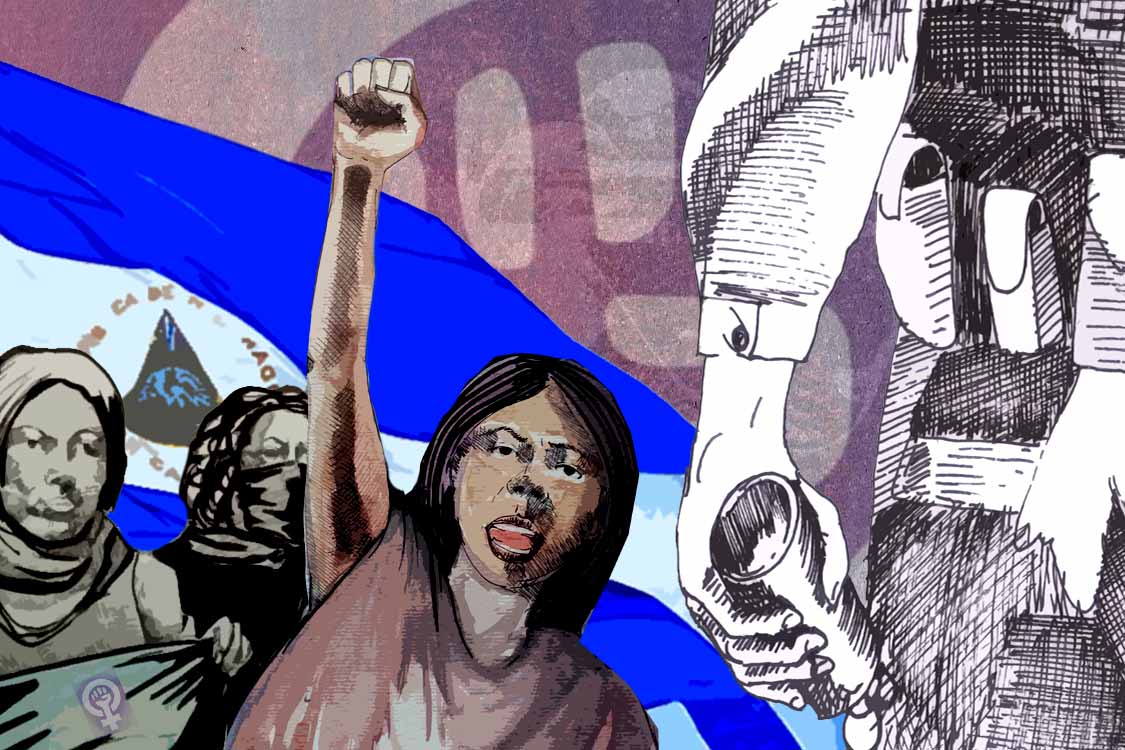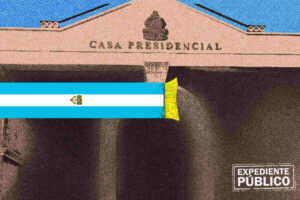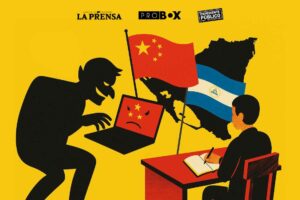With Daniel Ortega and Rosario Murillo in power, the Sandinista Front has consolidated its discourse against women’s movements, acting out against historic women’s rights and organizational power. The actions against organizations led by women and harassment against female leaders are based on anti-woman narratives and policies that have been in place for decades but that have intensified since April of 2018, according to various feminists and academics’ testimonies to Expediente Público.
The feminists interviewed explain that the repression against women that occurred in April represents the legacy of a political party that has built up hatred and, in order to compensate internationally for the repressive actions against female organizations, established participation quotas corresponding to the number of women required to serve public positions, guaranteeing positive rankings in international gender studies and arguing for its supposed restoration of women’s rights.
Violence Exercised by the Nicaraguan State: The Ortega-Murillo Regime’s Open War Against Feminism
In late 2018, the regime launched its biggest campaign against female-led groups, canceling the legal status of non-governmental organizations (NGOs) that had defended human rights since 1990.
This hatred against the feminist movement can be explained by the movement’s support for and accompaniment provided to Zoilamérica Narváez, Ortega’s stepdaughter who accused Ortega of sexual abusing her when she was a child.
Since 2018, the year many NGOs’ legal statuses were terminated by the regime, the government has continued to occupy and expropriate the properties and assets pertaining to organizations. Other feminist organizations have been financially stifled by the government’s failure to provide them with proof of compliance.
Following the 2018 civic uprising against Daniel Ortega and Rosario Murillo’s authoritarian rule, the regime staged head-on attacks against the main organizations of the Nicaraguan feminist movement, ultimately aiming to dismantle and silence an adversary that sought to expose and denounce the regime internationally for two decades.
The first attack involved the regime’s cancellation of the legal status of a dozen civil society organizations, relying on its political control over Parliament, the National Assembly, where, as a result of election fraud, Ortega achieved an absolute majority: 71 out of 92 congressmen.
The official parliamentary steamroller favored the cancellation of the legal status of NGOs with a long history of defending human rights and encouraging local leadership. Among these organizations were, the Nicaraguan Center for Human Rights (CENIDH), the Institute for the Promotion of Democracy (IPADE), and the Popol Na Foundation, all founded in 1990.
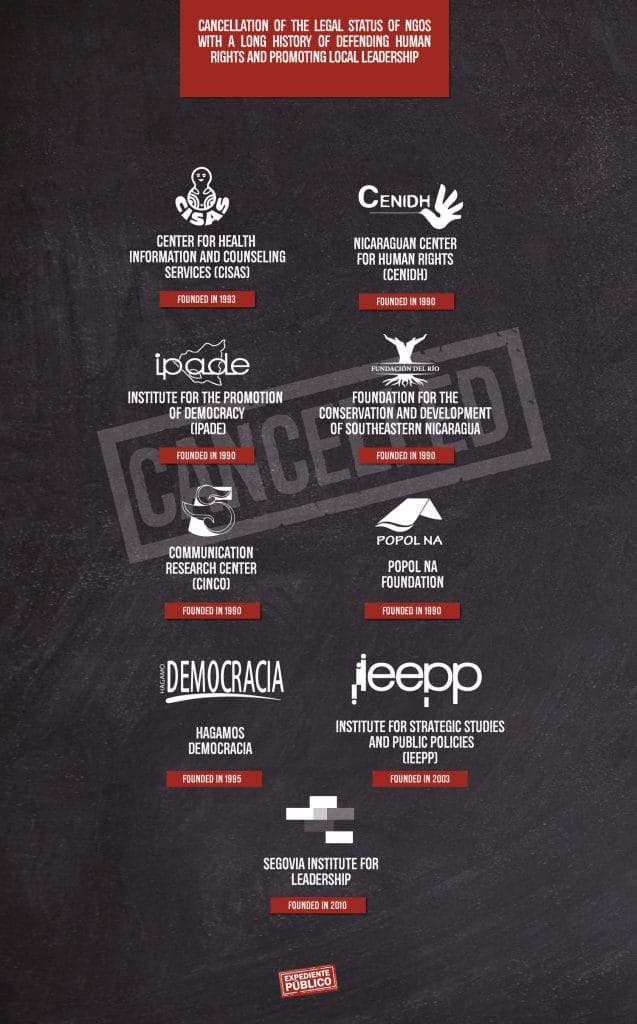
Between November 29 and December 13 of 2018, under the pretext of irregularities found in its directives, statutes, accountability reports, etc., Parliament acted against feminist groups at the request of the Ministry of the Interior (MINGOD). Parliament even applied the Law against Terrorism in some cases, making the case that organizations had used funds to encourage a coup d’état. However, this storyline of a «coup» orchestrated by NGOs was rejected by other governments and international human rights organizations.
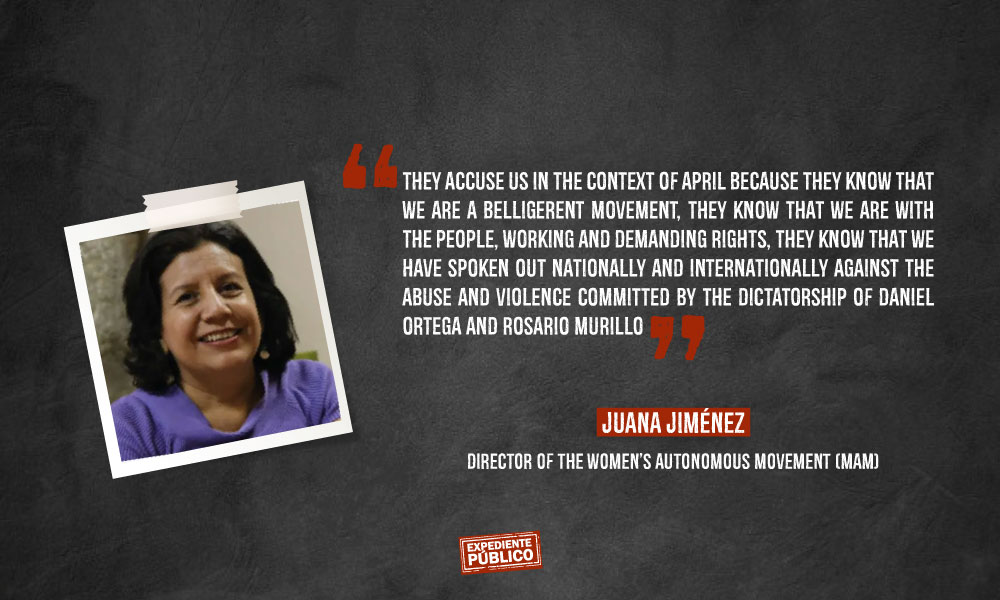
Jiménez assures that the accusation of civil society organizations’ encouraging a «coup d’état» only serves to legitimize the work of NGOs opposing abuses and systematic violations of Nicaraguans’ human rights.
“The culmination of these attacks was the expropriation of properties, made possible with the cancellation of the legal status of civil society organizations, where at least four were headed by women who had been critical in the fight for human rights,» added Jiménez, referring to Sofía Montenegro (CINCO NGO), Vilma Núñez de Escorcia (CENIDH), Ana Quirós (CISAS), Mónica Baltodano (Popol Na Foundation), and Haydeé Castillo (Segovia Institute for Leadership).
The Women’s Autonomous Movement (MAM), directed by Jiménez, was located at the headquarters of the Center for Health Information and Counseling Services (CISAS), founded in 1983. These installations, along with all of its property, were expropriated by the regime’s police forces and have since then been in custody of the National Police.
The government obliged Executive Director of CISAS, Ana Quirós, born in Costa Rica but of Nicaraguan nationality, to leave the country. Quirós calculated that the seizure of her organization’s two facilities, raided by force and still retained today, represent a loss of around $500,000 USD, the result of 35 years of hard work.
«The most unfortunate loss was not material but rather the physical experience of losing the people with whom we worked; they were left unemployed,» she told Expediente Público, referring to the community supporters who had worked with them since the organization’s founding in 1983.
Quirós, attacked and injured by pro-government mobs in April of 2018 while participating in an environmental protest, was later expelled from the country by Ortega’s regime, even though she has been a Nicaraguan citizen since 1990.
Almost eradicated
María López, founder of the Luisa Amanda Espinoza Association for Nicaraguan Women (AMNLAE), an organization that was tied to the Sandinsta Front, affirmed that, in addition to tactics used to supress protests against the government, the Law against Money Laundering, Terrorist Financing, and the Proliferation of Arms of Mass Destruction, has sought to eradicate organizations representative of the Nicaraguan feminist movement. Without the documentation needed to access outside development cooperations, these organizations cannot survive financially.
López alleges that the Ministry of the Interior does not issue timely board certifications nor proof of financial due dilligence, which prevents organizations from keeping their documents up to date, as well their ability to receive funds through bank transactions, practically resulting in the extinction of these civil society organizations.
Haydeé Castillo, founder of the Segovia Institute for Leadership, expresses, «they began supressing our rights and setting up accounting systems so that they could uncover every last detail and movement about the organization in order to find out what we were doing, with whom we were working, and if the workshops we were giving were related to human rights or empowerment initiatives.
Ironically, the same National Assembly, controlled by the executive branch, granted legal status to the Segovia Institute for Leadership in 2009, under the criteria that «its purpose was to strengthen the social fabric of the country through the promotion of comprehensive social programs primarily directed toward groups historically excluded from society, such as women and girls, ultimately striving to encourage empowerment, identity, citizenship, and community leadership, which would put beneficiaries in a position to influence their living conditions, decision-making, the use of public funds, and public policy, in favor of iniciatives consistent with their particular needs: all of which would expand opportunities for equitable development not only in the Departments of Madriz, Estelí, and Nueva Segovia but also throughout the nation and Central America.»
On December 12, 2018, the National Assembly, in its majority, voted in favor of cancelling the organization’s legal status and, two days later, the National Police broke into the headquarters of the Leadership Institue. Two years later, the State is still in posession of the property and its assets.
Castillo states that since 2012, the year Ortega was re-elected for a second consecutive term despite being prohibited by the Constitution to assume the presidency, women’s organizations whose work focuses on issues related to democracy and political advocacy have begun to eliminate said areas of work because development agencies do not fund them.
The leader in exile says that the Ministry of Foreign Affairs of the Republic of Nicaragua had influenced the disengagement and demotivation of foreign donors to invest in the issue areas and human rights organizations in general.
“Pressure from the Foreign Affairs Ministry began while Valdrack Jaentschke (Vice Minister of Cooperation) was in power, as public officials began to pressure and tell agencies with whom they could and could not work. There was a list of organizations that were frowned upon by the State of Nicaragua for working on human rights issues and citizen empowerment,” insists Castillo.
Former employees and collaborators at the Segovia Institute for Leadership live in exile throughout different parts of the world and, even so, through social media, receive numerous accusations of human rights violations from the rural population of Nueva Segovia in Nicaragua.
«Many of us pass the time in Costa Rica, but our souls live in Nicaragua; we continue living there in spirit,» confessed Ana Quirós, as she referred to the commitment that exiles of women’s groups and human rights organizations continue to feel.
Quirós refounded CISAS in Costa Rica, where the organization has legal status and focuses on the right to health for Nicaraguans who migrated to the country.
Likewise, CENIDH, run by Vilma Núñez, continues its work with only 14 staff members. However, from its ranks, the Never Again Nicaragua Human Rights Initiative (Nunca Más) was born in Costa Rica. A result of her schooling, the organization is making the human rights defender proud.
Solidarity with Zoilamérica: The catalyst
For Leonila Argüello, who is also part of the Network of Women Against Violence, the leadership confrontation between the Sandinista Front (Daniel Ortega and Rosario Murillo) and the feminist movement has intensified since 1998, the year that Zoilamérica Narváez publicly accused her stepfather, Daniel Ortega of sexual abuse when she was just a child.
The accusation, accompanied by a testimony of brutal abuse, had the backing and support from the majority of feminist movements in Nicargua, which remained by her side during the futile legal process that concluded with the dismissal of the Sandinista Judge Juana Méndez, former intelligence officer who later received the promotion of Supreme Court judge.
Rosario Murillo, Zoilamérica’s mother and Ortega’s partner, defended him publicly and questioned her daughter’s truthfulness, arguing that she was part of a political maneuver.
«The passing of accounts by women to women and everything that the women’s movement represents stems from Zoilamérica’s story. We cannot denounce abuses without denouncing the principal perpetrator in Nicaragua: Daniel Ortega Saavedra,» says Argüello.
Vilma Núñez, Juana Jiménez, and Ana Quirós also agree that, in the case of Zoilamérica, feminist organizations chose to believe the woman and, since then, that the regime’s wrath against these organizations has been evident.
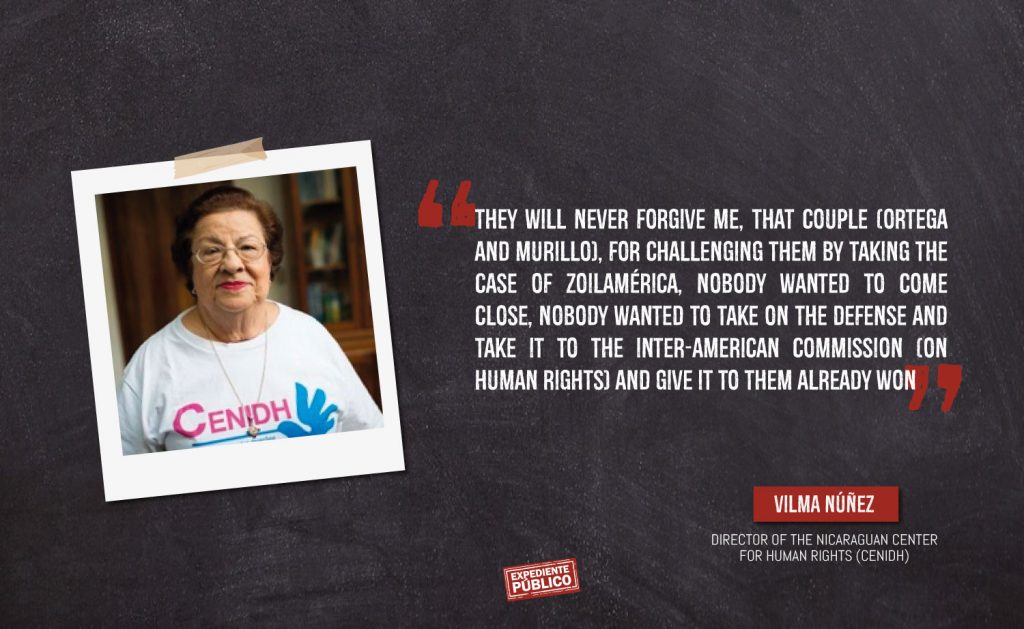
Núñez remembers that Rosario Murillo arrived to CENIDH begging her to drop the case against Ortega because it was a «Somocista stunt».
The case of Zoilamérica reached the Inter-American Court of Human Rights (see document), as Nicaragua had blocked any viable national legal route and the case had converted into an international scandal that seemed to look unfavorably upon Rosario Murillo and Daniel Ortega. Many Latin American countries that the Sandinista caudillo planned to visit were overwhelmed by feminist movements that publicly repudiated his presence.
Using Rosario Murillo’s behavior as an opportunity for a gender studies analysis, Juana Jiménez, coordinator of the MAM, asserts, «(Rosario) is part of a dynasty, the most extreme patriarcal excersise of power. In this powerful patriarchy that Daniel Ortega represents, Murillo turned her back on her own daughter, valuing and standing behind an abusive power, instead of the repugnant deeds committed against her own daughter.»
Daniel Ortega has received three allegations of child abuse. His stepdaughter, Zoilamérica Narváez made the first public accusation against him. Then, in October of 2006, the mother of a 13-year-old child with the initials PJOP filed another formal complaint before the Ministry of the Family, however, the case was archived by the government of Enrique Bolaños who transferred the presidential sash to Daniel Ortega in January of 2007. Lastly, in 2013, in order to acuse Ortega, the family of Elvia Junieth Flores traveled to the United States where the story was published by the Diario Las Américas in Florida.
Widespread harassment
Leonila Argüello, activist from Matagalpa’s Women’s Group, remembers that on November 23, 2019, she and other feminists from the group were besieged by the National Police for wanting to protest against gender violence.
That day, members of Matagalpa’s Women’s Group had placed 63 pairs of red shoes in the middle of the street located in front of the organization’s headquarters. Each pair represented a femicide registered that year.
Argüello explains the message of the event, «To those murdered women: we hold your memory close and continue speaking for you and fighting for you.»
Women who wanted to excersise their right to demonstrate in a civic manner were pushed and forced against the wall of the organization’s headquarters to prevent them from taking to the streets.
«‘Go inside, get in,’ were their ridiculous cries, something similar to what your mom would say to you if you were outside playing,» recounts Argüello, referring to the officer who, perched on the branches of a tree in front of the protesters’ side, led the riot police.
For Quirós, women’s organizations are enemies of the regime «because they are against impunity, corruption, and abuse» and have been the most consistent voices in condemning these actions since 2018.
Argüello of Matagalpa Women’s Group confirms that her organization suffered from a series of attacks even before 2018.
«In September of 2017, we held a national march for the right to health and for women’s ability to make decisions about their own bodies. With the national campaign of September 28th, we were faced with a sea of militarization in Managua. It was difficult to mobilize. We came from all departments of the country. There, the repression against us was very visible, as we were not allowed to continue the march,” Argüello reflects.
In 2016, during the annual carnival against gender violence, activists from various organizations in Matagalpa also had clashes with the government. They were given permission by the government to hold the march. However, at the same time, the Sandinistas conducted a countermarch, which was held by the Blanca Aráuz Movement, a pro-government women’s group.
«It was evident that the State had sent another women’s group to counter what we were trying to do,» adds Argüello.
Prior to 2017 and for more than 25 years, the carnival parades against violence were held by women’s groups in the northern part of the country and, during that time, the National Police protected the protesters from its post at the front of the march, stopping traffic and fulfilling its duties.
Before that, in 2014, the Departmental Delegation of the Ministry of Health in the northern city denied the Matagalpa Women’s Group access to data regarding infant mortality, hindering community outreach that the group sought to accomplish.
Moreover, four years earlier, in 2010, Argüello speaks to her and her counterparts’ being denied entry to the penitentiary system of Matagalpa, where they carried out social work on sexual and reproductive health and provided psychological and emotional support. The authorities of the prison system never offered explanations as to why they had not been granted entry, despite the group’s having spent six months requesting that information.
The regime «goes all out» against the blue and white
Since January 26, 2020, the image of María Esperanza Sánchez has been difficult to miss on social media, as she was imprisoned and sentenced to 10 years by the Nicaraguan government for the supposed crime of drug trafficking.
After having mobilized against social security reforms and widespread repression since April of 2018, María Esperanza was captured by police forces in a safe house in Managua. She had not given up on protesting, and there are photos of her at the anniversary masses held in Matagalpa in honor of the political prisoner, Eddy Montes, who was murdered by a prison guard. She was also seen in picket lines and former inmates’ artesanal craft auctions, explains her daughter, Sherly Sánchez.
Paradoxically, 15 days before the arrest of María Esperanza Sánchez, the Foreign Affairs Minister of Nicaragua, Denis Moncada, announced the positive results of the Global Gender Gap report as an important success of the Ortega-Murillo administration before the Assembly of the Organization of American States (OEA).
According to the Civic Alliance for Justice and Democracy, between March 28 and May 4 of 2020, the government arrested a total of 19 women, including one transgender woman, under possible political motives. Currently, there are three women imprisoned, including María Esperanza.
Female inmates suffer from all kinds of human rights abuses, as reflected in the report: Volviendo a ser humano (Focusing on the Human Being) published by Never Again Nicaragua Human Rights Initiative (Nunca Más) in December of 2019. The report registers testimonies of victims that have suffered from torture, abuse, sexual violence, and rape in the prison system.
The family members of María Esperanza Sánchez say that those close to political prisoners also suffer from sexual abuse while registering their visits with the prison guards. Prison guards, almost always women, touch visitors’ genital areas during their routine checks.
According to the Arias Foundation in its report: De la represión al exilio (From Repression to Exile), 35% of the 290 exiled Nicaraguans interviewed in Costa Rica had to flee Nicaragua due to the government’s attacks on the April 2018 protesters.
The act of fleeing constitutes forced displacement, another form of violence exercised by the State. According to the Arias Foundation’s report, 37.7% of those interviewed were unemployed, one of many factors that reduces migrants’ quality of life.
in the countryside,» Fernández stressed.

